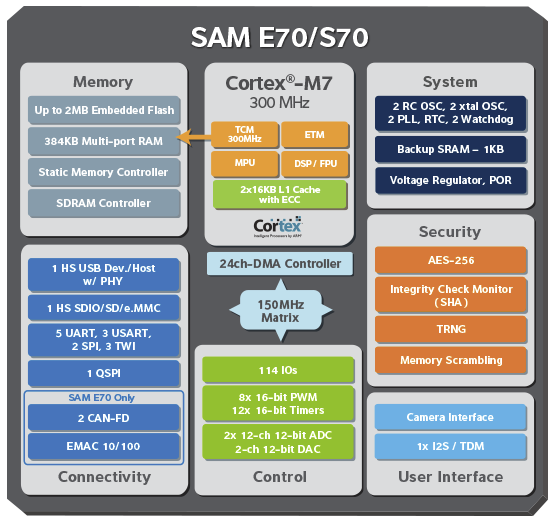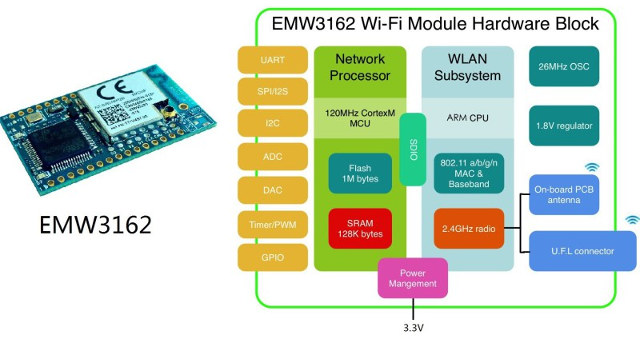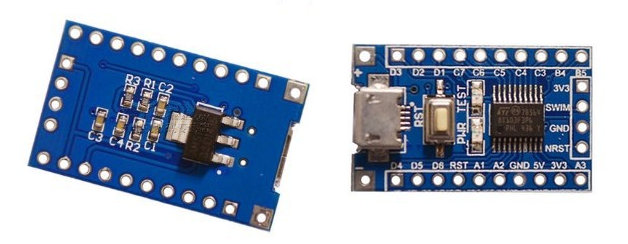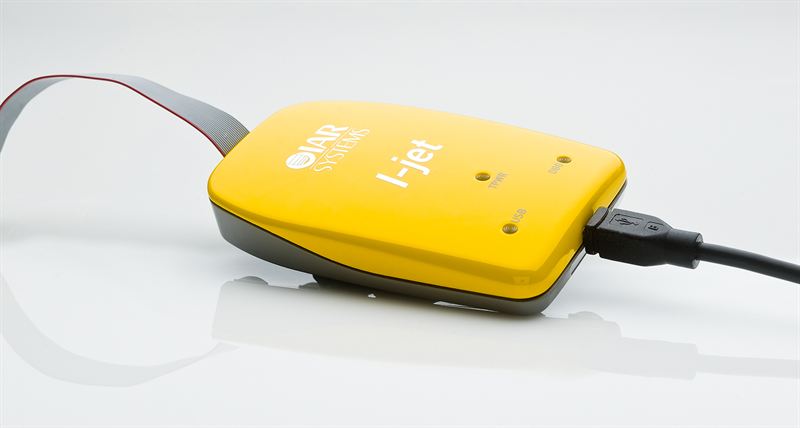ARM Introduced Cortex M7 IP in September, and ST Micro simultaneously announced its STM32F7 Cortex M7 MCU clocked up to 200 MHz, and boards are now available, including some running Linux. But two other companies have licenses Cortex M7, Freescale with its Kinetis KV5x micro-controllers which are yet to be mass-produced, and Atmel which has recently announced their SAM S70 and E70 micro-controllers are now in mass production. SAM E70 and S70 have similar features, but E70 offers some extra interface like CAN and Fast Ethernet: ARM Cortex-M7 core running at up to 300MHz (1500 CoreMark) Up to 2MB Flash and 384kByte SRAM Floating point unit (FPU) for high-precision computing and accelerated data processing High-performance internal memory architecture with user configurable Tightly Couples Memories and System memory, and 16kB I and D-cache High Speed USB Host and Device with on-chip high-speed PHY CMOS image sensor interface AES hardware encryption engines, […]
MXCHIP EMW3162 is a $10 Low Power Wi-Fi Module for IoT Applications
You can’t beat ESP8266 Wi-Fi modules on price to add Wi-Fi to your IoT projects, but Hackaday found a new Wi-Fi module by Shanghai MXCHIP Information Technology that sells for $10 on Seeed Studio or Amazon US, that should be better suited to battery operated project thanks to a lower power consumption. EMW3162 also features a more powerful STM32F205 cortex M3 micro-controller, as well as more I/Os than ESP8266. Specifications for EMW3162 Wi-Fi module: MCU – STM32F2 Cortex M3 MCU @ 120 MHz with 128KB RAM, 1MB flashOn Wi-Fi connectivity 802.11b, 802.11g, 802.11n (single stream) on channel 1-14 @ 2.4GHz WEP, WPA/WPA2 PSK/Enterprise (hardware encryption) Transmit power: 18.5dBm@11b; 15.5dBm@11g; 14.5dBm@11n MIN Receiver Sensitivity: -96 dBm Max Data rate: 11Mbps@11b; 54Mbps@11g; 72Mbps@11n HT20 Wi-Fi modes: Station, Soft AP and Wi-Fi direct Advanced 1×1 802.11n features: Full/Half Guard Interval, Frame Aggregation, Space Time Block Coding (STBC), Low Density Parity Check (LDPC) Encoding […]
Meet STMicro STM8S Based One Dollar Development Board
ESP8266 modules are $3 Wi-Fi boards targeting IoT applications that can be used in standalone mode, or connected to another MCU based board. But what if you don’t actually need Wi-Fi, but instead require a tiny board to control a few GPIOs? Arduino Pro mini can be used for this, but it costs about $10 on Sparkfun, and it’s certainly cheap enough for most projects. Switching to Aliexpress, you can get Arduino Pro mini clones for about $2, and a bit less in 10 pieces quantities. But you can get even cheaper and add a micro USB port with STMicro STM8S based boards that can be found for 5.5 CNY (Less than $1) on Taobao.com, or – once oversea shipping is factored in – about $1.60 to $1.70 on BuyInCoins, or Aliexpress without headers, and the version with headers sells for about $2 or more. Let’s check the board specifications: […]
IAR Systems Releases Embedded Workbench for ARM Version 6.40
Earlier today, IAR Systems has announced the release of version 6.40 of Embedded Workbench for ARM. This new version introduces several new features, enhancements and optimizations. The enhancements include a new source browser and text editor, with functionality such as auto-completion, code folding, block selection, block indentation, bracket matching, and zooming. Word/paragraph navigation have also been improved. IAR Systems also enhanced the compiler with improvements to the stack usage analysis functionality that provides calculations of the maximum stack depth for each call graph root and new features such as support for C++ source code and recursion. A new linker directive check can be used to calculate the stack usage at link time to verify that the used stack space does not exceed the allocated memory. The inline assembler has also been improved and expanded with a large number of new operand constraints and modifiers. In a previous post “Green Hills […]
IAR Systems I-jet Hardware Debugging Probe Is Now Available
IAR Systems has announced the availability of I-jet, a new in-circuit debugging probe that can be used in conjunction with Embedded Workbench for ARM, IAR C/C++ compiler and debugger tool suite. I-jet provides download speeds of up to 1 MB per second, JTAG and Serial Wire Debug (SWD) clocking at up to 32 MHz (no limit on the MCU clock speed), and Serial Wire Output (SWO) frequencies of up to 60 MHz. I-jet probe is powered by USB and can also power the target board (Up to 400mA) and measure the power consumption accuratly (200 uA @ 200khz). The probe is plug-and-play, and supports automatic core recognition, and direct download into the flash memory. I-Jet supports ARM7, ARM9, ARM11, ARM Cortex-M, ARM Cortex-R4, and ARM Cortex-A5/A8/A9 cores. Serial Wire Viewer (SWV), Embedded Trace Buffer (ETB) and JTAG adaptive clocking are supported and all JTAG signals can be monitored. The probe […]
Green Hills MULTI 6.0 Compiler Improves ARM MCU Performance by up to 40%
Last week at Design West 2012, Green Hills Software announced it had achieved the highest compiler performance scores ever certified by EEMBC CoreMark and that it outperformed the nearest competing compilers by 35.5% using its MULTI 6.0 – Compiler 2012. Benchmarks were completed on 3 ARM Cortex-M4 microcontrollers: Freescale Kinetis K60 MCU @ 100 Mhz – 35.5% improvement over nearest competitor. Freescale Kinetis K70 MCU @ 120 Mhz – 29.6% improvement over nearest competitor. STMicroelectronics STM32F417IGt6 @ 168 MHz – 34.7% improvement over nearest competitor. Since apparently it’s bad marketing to name competitors in press releases, I went directly to the source (EEMBC Coremark benchmark results) to check out the results and competitors (IAR and Keil) for Kinetis K60 MCU. The first thing you may notice is that there are 2 tests per compiler / MCU combination. That’s because there 2 test configurations: Code in internal Flash – Data in internal […]
Express Logic Releases ThreadX-Lite RTOS for ARM Cortex-M
Express Logic has unveiled its ThreadX-Lite Real-Time Operating System, a priority-based, preemptive scheduling RTOS for ARM Cortex-M development. It is exclusively be available via IAR Systems and is integrated with the C/C++ compiler and debugger tool suite IAR Embedded Workbench. ThreadX-Lite is “designed to be small, fast, and easy-to-use, while maintaining the functionality and efficiency of a highly optimized RTOS”. ThreadX-Lite targets Cortex-M0, M0+, M3, and M4-based microcontrollers from Atmel, Freescale, Fujitsu, Infineon, NXP, STMicroelectronics, and Texas Instruments. ThreadX-Lite is a subset of ThreadX RTOS, both RTOS share features and capabilities packaged in an object library as well as ThreadX API, but it is not very clear what the differences between the two are from the resources available. Here are the key feature of this RTOS: Small-footprint (small as 2KB, automatic scaling) Fast execution (sub microsecond context switch) Unlimited threads, semaphores, timers, queues, block pools, byte pools, and event flag groups […]









